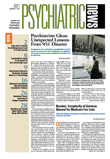According to Irvin L. “Sam” Muszynski, J.D., director of APA's Office of Healthcare Systems and Financing (OHSF), the jury is still out on whether most of the problems encountered with the launch of Medicare's new Part D prescription drug benefit have been resolved. Are beneficiaries now getting access to the medications they need? Or have physicians and patients simply given up the quest to obtain them?
“All we know at this point,” said Muszynski, “is that we've had some success in making the Centers for Medicare and Medicaid Services [CMS] aware of the problems facing psychiatrists who are trying to maintain their Medicare and dual-eligible Medicaid patients on the drugs they were taking before they entered Part D. We've been able to get a number of concessions from CMS when we've explained the kind of problems that are arising.
“However, we need to keep hearing from APA members about the problems they're encountering if we are to continue making progress with CMS. What we've found is that CMS is willing to solve problems on a case-by-case basis and to intervene with plans when complaints can be documented.”
One important change that has resulted from OHSF advocacy is that CMS issued a clarification explaining that coverage of medications cannot be denied because the prescribed dose exceeds the dose approved by the FDA (Psychiatric News, July 21). Part D prescription drug plans (PDPs) had been routinely denying access to brand-name medications that were prescribed at doses higher than those approved by the FDA. Although the reason given for these denials was often “patient safety,” the same kind of edits were rarely being used for generic drugs.
An issue that OHSF is now exploring with CMS is how physicians can be compensated for the extra time they are putting in so that their patients can have access to needed medications under Part D. Although CMS reports quick responses to physician requests, OHSF is hearing from APA members that they are still experiencing long waits on the telephone for prior authorizations. Such extensive expenditure of physician time had not been anticipated in the CPT coding system that forms the basis for determining Medicare payments.
As the first year of Part D nears its close (open season for Medicare beneficiaries to switch drug plans for 2007 is November 15 to December 31, 2006), Muszynski reminds APA members that any exceptions for drug coverage obtained in 2006 will probably have to be requested again for coverage in 2007. Although PDPs have the option of continuing exceptions beyond the plan year, it seems unlikely that many of them will do so.
Please inform OHSF about any problems you're having with Part D so staff can continue having a dialog with CMS based on actual problems and work toward their resolution.
Send e-mails to [email protected] or call (866) 882-6227. For the latest Part D information for psychiatrists, go to<www.mentalhealthpartd.org>.▪
